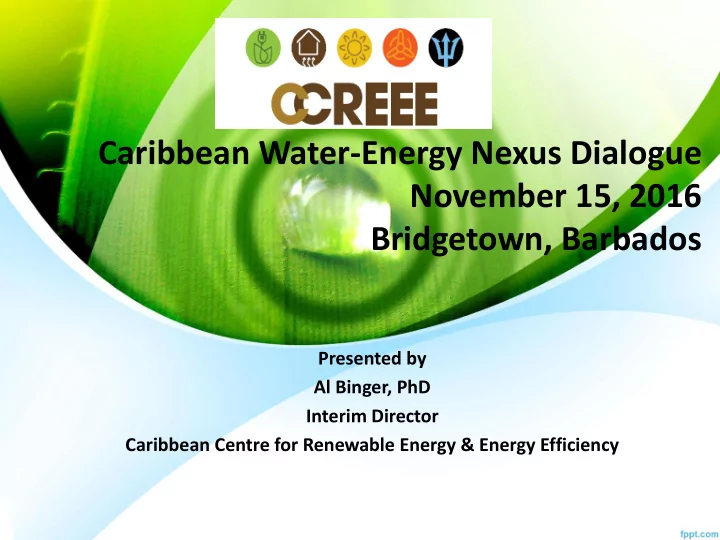

Caribbean Water-Energy Nexus Dialogue November 15, 2016 Bridgetown, Barbados Presented by Al Binger, PhD Interim Director Caribbean Centre for Renewable Energy & Energy Efficiency
Energy Issue Water Issue 21st Food Issue Century Population Environment Issue Growth
Energy Generation, Agricultural Production And Tourism • Power Generation - Total Installed Power, Energy Mix, 3% RE • C-SERM Goals and national ambitions • Agriculture – Regional Importance in terms of food security, net food importing countries, employment, Agro-energy – 90 percent imports • Tourism - Sector is largest energy user, major employer, major water user – Grenada drought • Interconnected role of energy, water and agriculture sectors can be addressed by cross-sectoral, holistic planning and policies – internationally, regionally and globally • Bringing it together through Public-private Partnerships
Energy • Electricity tariffs charged to residential consumers in CARICOM range from 8-9:00 US cents per kWh to over 40 cents per kWh • The financial status of some utilities is weak due to high diesel generation costs and technical and commercial efficiency losses • Low energy efficiency in buildings, appliances, industrial processes and technical and commercial grid The available RE&EE potentials remain largely untapped • Increasing extreme weather events impact infrastructure and energy planning
Water • In most Caribbean islands (with Dominica and Jamaica as exceptions), rainfall is the sole source of freshwater, with several islands depending on the use of desalination water • Ensuring access to freshwater will become increasingly challenging for Caribbean countries as global temperatures and sea levels continue to riseEngage your Audience • The Inter-Governmental Panel on Climate Change (IPCC) reports that water resources will be affected negatively, as models predict that the region’s annual precipitation could decrease by about five percent during the period to 2050, and by about seven percent by 2080
Agriculture The region’s agriculture sector, already besieged by economic forces both local and international, will find it very difficult adapting to the impacts of climate change. The vast majority of agricultural production across the region is rain-fed. The projected reduction in precipitation would have a serious impact on food security and exports. The impact of climate change on agriculture is linked to its effects on water resources.
• Are there Relationship between these issues? • What are the nature of these Relationship? • How has (is) National Planning and Policy addressing these relationships? • How has the Silo structure of Government performed? • How is Climate Change being incorporated?
• Relationships – 1000 tons of water for the production a ton a cereal • Provision of Fresh water is a major consumer of Energy • Generation of fresh water is land use issue – forestry • Oceans are the largest SIDS resource for water and renewable energy – daily 25-35K boe/hectare for SIDS Ocean resource 16 time EU area
• There is more energy incoming to the ocean of SIDS daily than used in a year by the entire planet • We chosee to use More than USD 30 billion to import more than 220 million barrels inn oil • In the process accumulating massive debts – how bad 14 of 15 most indebted countries are SIDS – some debts as high a 140 percent of GDP • Imported oil used with very low efficiency less than 30 percent of energy used for good and services – the rest entropy In some countries increasing aount of energy used for desalination – when we could get it as a low cost co-product from ocean energy generation systems
• A 10 MW OTEC plant would give in addition of baseload power with much higher availability than thermal plant some 12 million liters per day and thousand of tons of high value mari-culture products, as well as alternate means of cooling – which uses some 60 percent of power use in Hotels and commercial buildings. • OTEC deployment is an adaptation measure to CC impact of reduced and increasingly unpredictability of rainfall – which will impacts our Ag Sector – Bananas
Waste Water • A resources that is un-utilized and results in growing environmental problems and reducing fresh water availability • A major source of nutrient pollution of the coastal environment – in particular Phosphorus • As a resource waste water would provide critical input for agriculture – lowering the dependence on rainfall – rather than degrading our most valuable marine resource our coral reefs – we need to end the use of outflow pipes • Continuation of current practices make our coasts much more vulnerable to erosion • Waste water is major resource for Biomass production one ton of cereal needs 1000 tons of water – so we are also importing a lot of water – while we waste our resources
Concluding Comments – Changing for our Survival • Maximizing the potential synergy between Energy, Water, and Food production requires changes in the way we do planning, policy and governance – we need new tools such as multi-variable analysis that quantify co- products. • Changes in the way government intervention is structured – pork production replacing fish – CC impacts – resulting in water pollution – source of energy – biogas technology • Changes in the assistance from development partners and the MLI – WB – UNDP – who are organized by sectors. • The Role of Economics – decision tool or measuring tool
Concluding Remarks • We need to address vested interest • We need to have cooperation from development partners – to understand that SIDS are not just scaled down continental countries • We need greater cooperation between SIDS to promote the deployment of the technologies that allow for development of our largest natural resource
Thank You
Recommend
More recommend